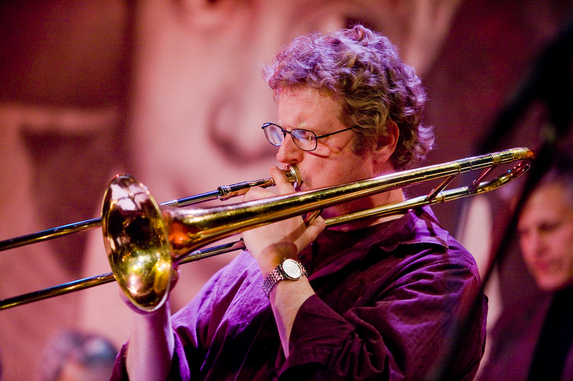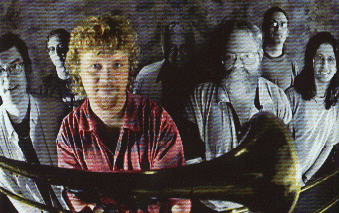Many never find their “voice”, while others never even think to search for it. In a world of imitations and cheaper images of beauty, Garling is a beautiful original. A gifted writer, talented leader and inspired improviser on the trombone, Garling blew out of Chicagoland and into the jazz world with Buddy Rich and Maynard Ferguson. His solo album, “Maynard Ferguson Presents Tom Garling”, remains one of the freshest, most mature and satisfying debuts in jazz to be heard. And that was just the beginning! Now a leader of his own jazz orchestra, Garling’s voice is amplified with treasured colleagues and seasoned with lifes deeper meanings. If you don’t know Tom, you are in for a treat; if you do, a connoisseur’s delight! “1385”tm, is delighted to present the preemininent jazz trombonist of his generation, Tom Garling.
1. Which players inspired you the most as a teen?
When I was about 13, I hadn’t caught the jazz bug yet. I was into rock and played keyboard (and later added guitar) in rock bands until about 16 or 17. Here are just a few bands that loved: Boston, Led Zeppelin, Yes, Eagles, Joe Walsh, Pink Floyd, REO Speedwagon (early). This was music that my brothers and friends listened to. In high school, I made friends with the people in jazz band, and took a jazz class that met during “zero” period, around 7:00 am. I began to love jazz at this time. Here is a small list of people I listened to that helped me fall in love with jazz: Preservation Hall Jazz Band, Rob McConnel, Michael Brecker, Miles, John Coltrane, Bill Watrous, Carl Fontana…
Early in your career? Adding to this list, as I grew into my college and Buddy years (keep in mind this is just a partial list, and not in any particular order of preference, but only as I think of them): later John Coltrane, Wayne Shorter, Steve Grossman, George Garzone, Jerry Bergonzi, more Miles, Chick Corea, Bill Evans, Sonny Rollins, Kenny Wheeler, Weather Report, Tribal Tech, Frank Rosolino, JJ Johnson, Duke Ellington, Count Basie, Herbie Hancock…..
Now? Do you hear any of them coming out of your horn?I’m always adding new music to my list of influences. Some are older albums by established innovators that I’d never heard before, and some are new emerging artists. Here are some recent artists: Kenny Garrett, Roy Hargrove, Snarky Puppy, Steve Davis, Elliot Mason, Michael Dease. (again, just a partial list). I believe all of my influences are coming through my horn whether I recognize it or not.

2. You have enjoyed success as a leader, a trombonist, a soloist, an arranger and as a writer! How do you go about balancing these diverse activities and maintaining such high quality?
I’m extremely grateful to have had a steady influx of jobs in music, but I never considered myself very good at managing my time. I just take jobs as they come-or don’t take them if I can’t fit them in. Like everybody, I keep a calendar of gigs, writing deadlines, and my teaching schedule, and try to give myself enough time to prepare for each event. For writing, I reserve days in my calendar for just composing-something I had to learn about the hard way when I found that time was not available. For gigs and teaching, I reserve days in my calendar to practice the material needed for the gig, or compile assignments and teaching material for classes and lessons. On top of that, I make sure to play my horn everyday to keep my chops up. Like a lot of people I know, I work best with a deadline!
3. What did Buddy Rich and Maynard Ferguson mean to you and the jazz era of the 1970’s and 1980’s?
Buddy and Maynard meant everything to me musically and personally. There is nothing like playing music at such a high level every night to hone your craft. Buddy’s band was my first experience at this, and it was exhilerating to say the least. After five years of playing with Maynard, my chops were strong! They both were responsible for helping to launch my career as a known jazz musician. I didn’t know it at the time, but playing with Buddy turned out to be a clear path to go to music school for free. Maynard loved to promote his sidemen and be involved in music education. As a result, I was able to hone my skills at teaching, giving clinics and masterclasses around the world with Maynard and the band. He also produced my first album on Concord Records as part of his brain-child, the”Maynard Ferguson Presents” series. For all of this, I feel that I owe everything to them.
In the world of jazz, there still hasn’t been a drummer yet that could match what Buddy did, in my opinion. He was simply the best drummer I will ever play with. His time was more driving and energetic than anyone, and he set the bar for big band drumming-time, set ups, fills, solos, etc. When he was soloing, his sticks were a blur! All of the great well known drummers that came after him have regarded him as an influence. Bud Herseth said this of Maynard: “He’s one of the greatest trumpet players of the 20th century”. I think that about sums it up. When Maynard played, he had a sound that was so big, it was like 10 trumpets playing at once! Like Buddy, all trumpet players will turn to him for influence.
4. How do you see the trombone as an expressive voice?
I think all instruments are expressive in the right hands. What is special about the trombone is the slide, giving it a “vocal” quality. It affords the player to easily bend and slide into notes much like a voice would do. In that spirit, the great trombonists have always looked to vocalists for inspiration in how they inflect their music.
5. Who are some of your favorite band mates, their musical achievements and extra musical attributes?
I have played with so many great musicians over the years, it’s hard to just pick some and say they were my “favorite”. All of them were great to play with in their own way. It would be easier to ask: “Who were the musicians you didn’t like playing with”, and that would be a very small list.
For a long time, people have been asking me “When are you going to put your own big band together?” and just recently, I’ve done that. Choosing the members for the band was not easy, but I decided to pick them based on something they did on a gig at one time that affected me in a deeply visceral and positive way-their sound on a single note, or a solo they played, or the way they communicated with the musicians around them, to name a few examples.
Their achievements have less to do with commonly perceived success in their careers, and more with their search for the divine through their instrument. You can hear the dedication and unconditional passion in every note they play. So, in short, without “name dropping”, these are my favorite band mates.
6. Who do you look to as the great writers for 6-8 pieces?
Duke Ellington and Billy Strayhorn, Wayne Shorter, Herbie Hancock, Bobby Timmons, Horace Silver. Freddie Hubbard, Oliver Nelson. to name a few.
7. What do you look for in a horn for various circumstances?
I’ve been playing the same horn for many years (King 2b jiggs). If I were to describe what I look for in a horn, I would say the obvious things, like good intonation, good sound, a horn that slots well in all registers. If these things are sound in my playing, the circumstances don’t matter much, whether jazz, rock, salsa, playing like Tommy Dorsey, etc.
If I were to get a call to play a classical gig, a bigger horn more suited for that style would be needed. It’s probably a good thing that I don’t get many of those calls, and if I did, I think long and hard before accepting it. There might be a better horn out there for my needs, but I’m more of a “get personal with what you have” kind of guy. If there is an issue with some aspect of my playing, I tend to look in the mirror, rather than blame the horn. As long as there are no major problems with a horn, a practice routine that tackles the areas that need work is what’s needed. 

8. Which is more crucial: listening versus transcribing in developing your soloing? Whether transcribing or not, listening and mimicking is absolutely necessary. You’re not a musician unless you learn to play music of the past by ear. I have know many great players that never wrote down a solo on paper. They just listen and steal ideas from their favorite players.
Having said that, I think transcribing is important. I have found that by the time I’ve finished writing out a transcription, I have the solo memorized because I’ve listened to it over and over again. Transcribing also helps your calligraphy, sight-reading and rhythmic and pitch notation. It’s important as a musician to learn to sightread music, and link up what you see with what you hear.
9. What inspires you now?
Playing music with great musicians always inspires me. In addition, music that I’ve never heard before that I enjoy helps to keep my creative juices flowing. I’m also inspired by hearing one of my charts played by a great band, an impetus for writing. Also, new discoveries about the world, new perspectives, new knowledge, musically and personally.
For example, right now I am working on lip slurs to smooth out my lines. I always practice various things that help me to perform the music I’m asked to play, like fast moving scales and lines, tonguing exercises, interval drills, and playing a line in all keys. When I find something that is not coming out right, I concentrate on that for a while.
c. 2019 David William Brubeck All Rights Reserved www.davidbrubeck.com
Photos courtesy of:
www.maynardferguson.net & www.tomgarling.com


